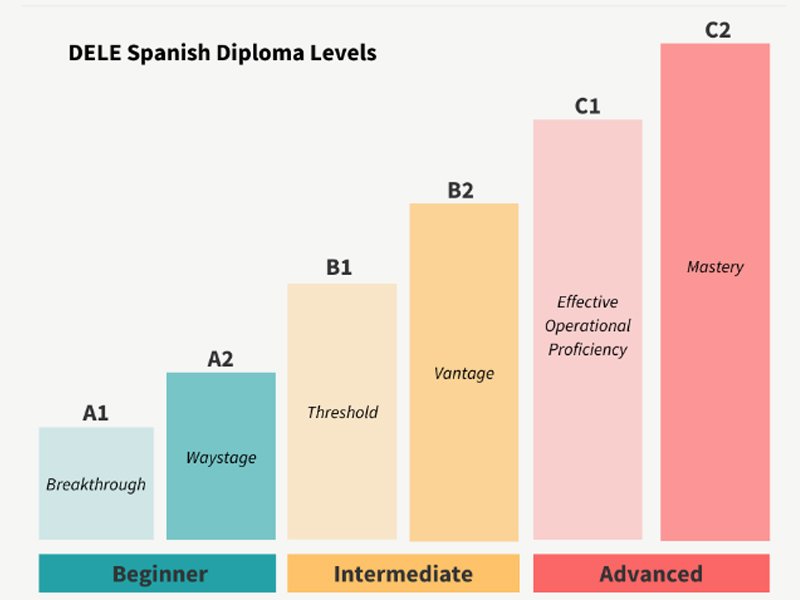5 reasons to take DELE exam and test your Spanish language skills
Why are you learning Spanish?
Is it because you would like to travel to Spain and Latin America?
Is it because of your partner?
Is it because you would like to enroll in a Spanish, or Latinamerican university?
Is it because you would like to find a job in a Spanish-speaking country?
Or, is it because you want to do business in a Spanish-speaking country?
Any of these reasons are great motivations for learning such a beautiful language.
If your motivation is traveling, doing business or speaking your partner’s mother tongue, you can just learn General Spanish.
But, if your motivation is finding a job or continuing your studies in Spain or Latin America, you might need proof of competency.
What is it a proof of competency?
Proof of competency is a written certificate attesting to language proficiency.
All languages have their proof of competency. For instance:
- English has TOEFL and IELTS
- French has DILF, DELF, and DALF
- Spanish has the DELE and SIELE
What Is the DELE Exam?
DELE stands for Diploma de Español como Lengua Extranjera. In English “Diploma of Spanish as a Foreign Language.”
These diplomas are official titles certifying the degree of competence of the Spanish language.
Spain’s Ministry of Education, Culture and Sport grants the certification. The Instituto Cervantes organizes examination sessions. And the Universidad de Salamanca in Spain designs and corrects all exams
DELE diplomas consist of six levels. With “A” being Beginners; “B” Intermediate, and “C” Advanced.

The score you get acts as certification to prove your competency in the Spanish language.
Anyone can take the DELE exam as long as they prove they are not citizens of a Spanish-speaking country. Once you get the certification it never expires.
You can do the registration online. And, you can also read more about the requirements, deadlines and fees on their website.
Why take the DELE exam?
1. It’s recognized worldwide
From all the language proficiency certificates, DELE is one of the newest. It was created only in 1989.
It is the most recognized Spanish language test worldwide. It comprises the four skills: speaking, listening, reading and writing.
It is used to measure language proficiency for academic and professional purposes.
2. It will help you get into universities
A DELE certificate is one of the universities’ requirements for international students. So, if you are planning on continuing your education in Spain or Latin America, you would need it.
The university can determine whether you have the right language level for their course you are applying to.
Most of the universities require that your Spanish language proficiency is at a B2 level.
According to DELE’s official website, B2 level:
“Certifies students’ ability to interact with native speakers with a sufficient degree of fluency and spontaneity to enable easy and natural communication between interlocutors; produce clear and detailed texts about diverse topics, as well as defend an opinion about general topics, expressing the pros and cons for each argument; and lastly, understand the gist of complex texts about both concrete and abstract topics, including technical texts, provided they are within the candidate’s area of expertise.”
3. It’s great for your career
Having a language certification as DELE will surely help to boost your CV. Also, it will open doors for your future career.
Spanish is one of the most spoken languages in the world. It is spoken in more than 20 countries.
Thus, it will put you in an advantageous position with other candidates in the job market. Employers generally use this certification to measure your language level for them.
To work in a Spanish-speaking country you normally need to have at least a Spanish level of C1.
According to DELE’s official website, C1 level:
“Certifies sufficient linguistic competence to understand a wide variety of lengthy, and somewhat demanding texts, as well as to grasp implicit meaning in the same; to express themselves fluently and spontaneously without apparent effort to find the right words; to be able to use the language flexibly and effectively for social, academic, and professional purposes; and finally, to be able to produce clear, well-structured, and detailed texts about topics of some complexity, correctly using mechanisms of organization, articulation, and cohesion in the text.”
4. It’s a good training exercise for your Spanish language skills
Taking the DELE is also very useful for exercising and improving all four language skills (i.e. speaking, reading, writing and listening).
When learning the language some people focus more on certain skills. They generally focus on speaking and listening. However, it is important you learn and improve all four skills.
Make sure you train all skills simultaneously!
5. Live in the country
To live in Spain or Latinamerica you won’t need the DELE. However, if you have already decided you want a new life in any of the Spanish-speaking countries it’s better you take the exam.
At some point, you might apply to a new job or you might get interested in enrolling in a local university. You might also decide to apply for citizenship.
To apply for citizenship in Spain, for instance, you do need to take a DELE exam. But don’t worry the good news is, it’s only the A2 exam.
According to DELE’s official website, A2 level:
“Certifies that the student is able to communicate using the language in a basic way in situations having to do with immediate needs or everyday situations.”
But, if you want to integrate into your new community we recommend trying to achieve at least level B2 or level C1.
Interested in taking the DELE?
We would love to help you to get the best DELE score. In our Spanish school in Bogota, we would be happy to guide you throughout the process.
Check our DELE exam preparation course, and let’s start!













